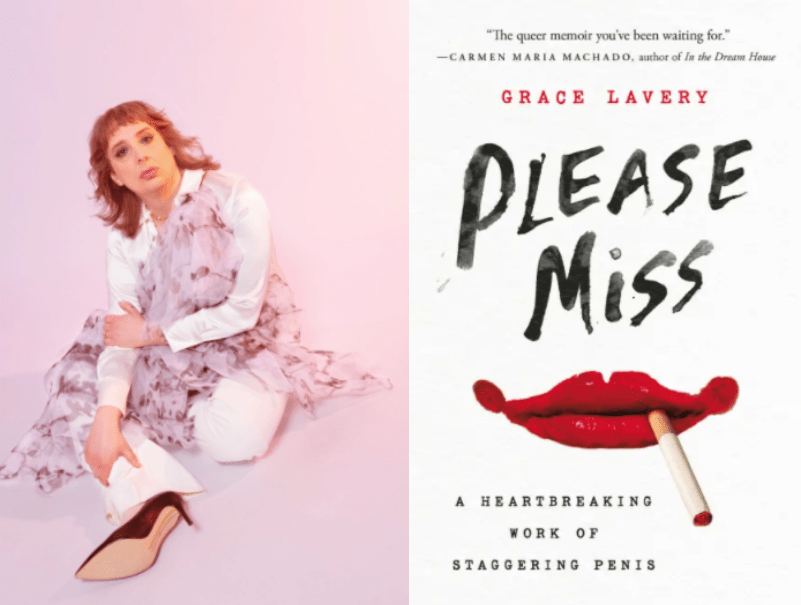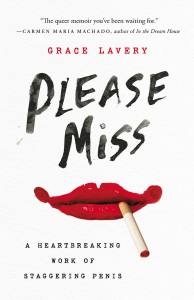Grace Lavery
 Grace Lavery is an associate professor of English at University of California, Berkeley. A prominent public intellectual and activist, she has contributed to the Los Angeles Review of Books, Autostraddle, the New Inquiry, Them, the Guardian, Foreign Policy, and Slate. She’s been sober since January 2016 and “full time” as a trans person since March 2018. She lives in Brooklyn, New York.
Grace Lavery is an associate professor of English at University of California, Berkeley. A prominent public intellectual and activist, she has contributed to the Los Angeles Review of Books, Autostraddle, the New Inquiry, Them, the Guardian, Foreign Policy, and Slate. She’s been sober since January 2016 and “full time” as a trans person since March 2018. She lives in Brooklyn, New York.Please Miss gives us what we came for, then slaps us in the face and orders us to come again. Grace Lavery is a reformed druggie, an unreformed omnisexual chaos Muppet, and 100 percent, all-natural, synthetic female hormone monster. As soon as she solves her “penis problem,” she begins receiving anonymous letters, and sets out on a magical mystery tour to find the source of these surreal missives.
Buy the Book.

Okay, so this is kind of nuts, but my big lockdown hobby was fermentation, and my apartment is now stacked with vinegars, kombuchas, misos, pickles, and lacto ferments that I’ve made over the last few months. Here I am preparing three of the vinegars: from butternut squash, watermelon juice, and home-brewed plum wine, which I turned into vinegar at once because I don’t drink alcohol. I got all this from reading the René Redzapi guide to fermentation, which is an incredible cookbook, but the principles of brewing vinegar are really straightforward: if you’re using fresh juice (as I did with the watermelon and squash) you just add 8% of the mass of juice in everclear, and then 20% of the combined mass in that one brand of unpasteurized vinegar (the easiest is that one brand of cider vinegar everyone uses). Then you run air through it with an air stone and pump, and leave it about a week until the ethanol has converted into acetic acid. It is fun and feels like science, which is probably is on some level.

 I’m a Pisces sun, with an Aries moon, and most of the rest of my chart in Aries. I think of it as the “cock-in-a-frock” chart: floofy and creative on the outside, and goal-oriented and driven underneath. I don’t know if that’s accurate, I suppose it’s for others to say. It depends how well I’m hiding my ruthless ambition!
I’m a Pisces sun, with an Aries moon, and most of the rest of my chart in Aries. I think of it as the “cock-in-a-frock” chart: floofy and creative on the outside, and goal-oriented and driven underneath. I don’t know if that’s accurate, I suppose it’s for others to say. It depends how well I’m hiding my ruthless ambition!
 I’m a thirtysomething white transsexual who lives in Brooklyn, so I’ve been listening to Lana Del Rey nonstop for almost two years. It started when I moved to New York, believe it or not: I commute to California, which means I’m often on planes, and often sleeping on planes, and would soundtrack those first few flights with the hits, “Young and Beautiful” and “Video Games” and a couple of others. The lazy, nocturnal self-regard seemed to match the vibe of a night flight. But eventually, I found something quite unexpected and specific in Lana’s music, that I don’t think exists anywhere else: it is, truly, bicoastal. Lana was born in Manhattan and lives in L. A., and her work seems to oscillate between California and New York: in “Off to the Races,” to name just one example, she seems to be both in L. A. (“Château Marmont”; “I have an L. A.-crass way about me) and in New York (“facing time again at Rikers”; “Coney Island baby”). Versions of that switch show up all over the place in Lana’s music. The albums sway back and forth too, displaced but not deterritorialized, as though existing in these two places, or perhaps between them, in the way that a current flashes between two poles.
I’m a thirtysomething white transsexual who lives in Brooklyn, so I’ve been listening to Lana Del Rey nonstop for almost two years. It started when I moved to New York, believe it or not: I commute to California, which means I’m often on planes, and often sleeping on planes, and would soundtrack those first few flights with the hits, “Young and Beautiful” and “Video Games” and a couple of others. The lazy, nocturnal self-regard seemed to match the vibe of a night flight. But eventually, I found something quite unexpected and specific in Lana’s music, that I don’t think exists anywhere else: it is, truly, bicoastal. Lana was born in Manhattan and lives in L. A., and her work seems to oscillate between California and New York: in “Off to the Races,” to name just one example, she seems to be both in L. A. (“Château Marmont”; “I have an L. A.-crass way about me) and in New York (“facing time again at Rikers”; “Coney Island baby”). Versions of that switch show up all over the place in Lana’s music. The albums sway back and forth too, displaced but not deterritorialized, as though existing in these two places, or perhaps between them, in the way that a current flashes between two poles.

 Most of the time I write in bed. I know it’s lazy, but the truth is I’m both a workaholic and pathologically indolent, so writing in bed has its advantages: sometimes I start to write (on my phone usually) before anyone else is awake; sometimes I drift through a morning feeling like I’m having a lazy lie-in, and then before noon comes I will realize I’ve written a few thousand words without having really realized I was working. The work of mine that I like most is that which most closely resembles the condition of my dreams––I like it, because I can position myself as an interpreter of the association, rather than someone who has to defend it. A lot of my work, both as a critic and as a creative writer myself, is an attempt to apply rational thought to ideas whose origins are not necessarily rational, and so for me it makes sense to stay close to the topologies where my unconscious mind has the most sway––chiefly, the pillow. Plus when I’m lying in bed I get to look all the way through my north-facing Brooklyn railroad apartment, watch my two puppies running up and down the apartment and occasionally jumping up onto me, and then at the far end, out of the windows at the far end, at the Manhattan skyline, up past Wall Street and City Hall as far as the Empire State Building. I love New York, and my bed is a raft over it, sailing into and out of it, public and private, above and underneath.
Most of the time I write in bed. I know it’s lazy, but the truth is I’m both a workaholic and pathologically indolent, so writing in bed has its advantages: sometimes I start to write (on my phone usually) before anyone else is awake; sometimes I drift through a morning feeling like I’m having a lazy lie-in, and then before noon comes I will realize I’ve written a few thousand words without having really realized I was working. The work of mine that I like most is that which most closely resembles the condition of my dreams––I like it, because I can position myself as an interpreter of the association, rather than someone who has to defend it. A lot of my work, both as a critic and as a creative writer myself, is an attempt to apply rational thought to ideas whose origins are not necessarily rational, and so for me it makes sense to stay close to the topologies where my unconscious mind has the most sway––chiefly, the pillow. Plus when I’m lying in bed I get to look all the way through my north-facing Brooklyn railroad apartment, watch my two puppies running up and down the apartment and occasionally jumping up onto me, and then at the far end, out of the windows at the far end, at the Manhattan skyline, up past Wall Street and City Hall as far as the Empire State Building. I love New York, and my bed is a raft over it, sailing into and out of it, public and private, above and underneath.
 There are so many, so I’m just going to mention a movie I saw recently and enjoyed way more than I expected to: the Danny Boyle and Aaron Sorkin version of Steve Jobs. I’m sort of skeptical of both Boyle and Sorkin––the former seems too enamored of British quirk, and the latter seems to love institutions (and the men who profit from them) a lot more than anyone should. And I really don’t give a shit about Steve Jobs or Apple or computers or whatever. So let’s get that all lined up. But there was something about the movie that was really moving to me: the symphonic arrangement in male inadequacy, playing in every octave and across every key. Jeff Daniels as a clumsy and failed father-figure, Seth Rogan as a self-deceiving narcissist, and in the center, Michael Fassbender as this lisping, snarky fraud. There was something honest about the movie, not just from a Sorkin for once able to treat the myth of male genius with the contempt it deserves, and therefore perhaps to look in the mirror he keeps in the attic; but from a Boyle for once able to think about historical causality in something like a structural way. I appreciated it a lot. I have no intention of reading the book.
There are so many, so I’m just going to mention a movie I saw recently and enjoyed way more than I expected to: the Danny Boyle and Aaron Sorkin version of Steve Jobs. I’m sort of skeptical of both Boyle and Sorkin––the former seems too enamored of British quirk, and the latter seems to love institutions (and the men who profit from them) a lot more than anyone should. And I really don’t give a shit about Steve Jobs or Apple or computers or whatever. So let’s get that all lined up. But there was something about the movie that was really moving to me: the symphonic arrangement in male inadequacy, playing in every octave and across every key. Jeff Daniels as a clumsy and failed father-figure, Seth Rogan as a self-deceiving narcissist, and in the center, Michael Fassbender as this lisping, snarky fraud. There was something honest about the movie, not just from a Sorkin for once able to treat the myth of male genius with the contempt it deserves, and therefore perhaps to look in the mirror he keeps in the attic; but from a Boyle for once able to think about historical causality in something like a structural way. I appreciated it a lot. I have no intention of reading the book.
“The queer memoir you’ve been waiting for”—Carmen Maria Machado
Grace Lavery is a reformed druggie, an unreformed omnisexual chaos Muppet, and 100 percent, all-natural, synthetic female hormone monster. As soon as she solves her “penis problem,” she begins receiving anonymous letters, seemingly sent by a cult of sinister clowns, and sets out on a magical mystery tour to find the source of these surreal missives. Misadventures abound: Grace performs in a David Lynch remake of Sunset Boulevard and is reprogrammed as a sixties femmebot; she writes a Juggalo Ghostbusters prequel and a socialist manifesto disguised as a porn parody of a quiz show. Or is it vice versa? As Grace fumbles toward a new trans identity, she tries on dozens of different voices, creating a coat of many colors.
With more dick jokes than a transsexual should be able to pull off, Please Miss gives us what we came for, then slaps us in the face and orders us to come again.

